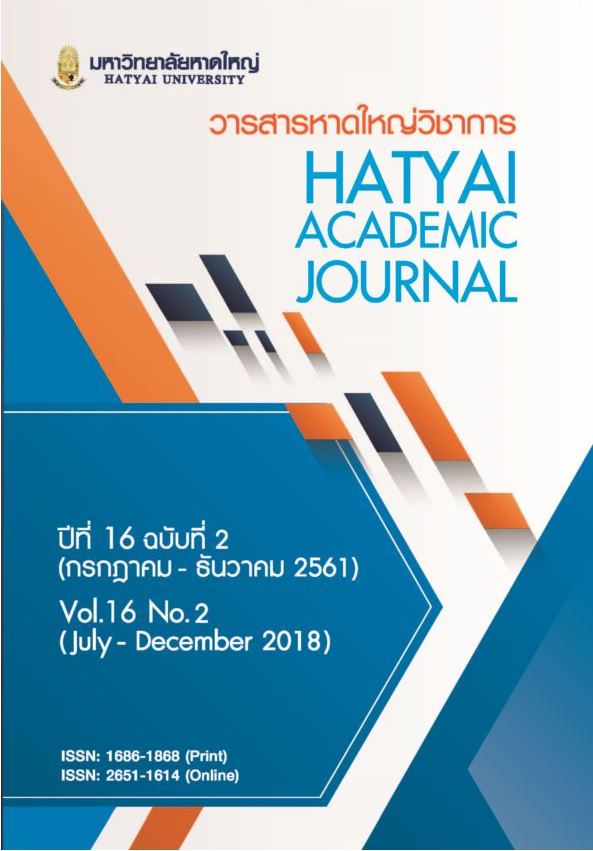โมเดลความสัมพันธ์เชิงสาเหตุของการใช้สมาร์ทโฟนของเด็กและผู้ปกครองที่ส่งผลต่อความฉลาดทางอารมณ์ของเด็กปฐมวัย
Main Article Content
Abstract
This empirical research aimed to study the causal relationship model of preschool children’s and parents’smartphone addiction and factors affecting the emotional intelligence of the preschool children. The sample, derived by means of stratified random sampling, consisted of 200 preschool students aged between 3 to 5 years from Chonburi Province. Questionnaires, the research instrument, were analyzed by the use of Descriptive statistics. LISREL 9.30 was introduced in the study for the Structural Equation Model. The results indicated that the hypothetical model was consistent with the empirical data. Goodness of fit was demonstrated by following measurements: chi-square test = 12.23, df = 15, p = 0.66, GFI = 0.99, AGFI = 0.97, CFI = 1.00, RMSEA = 0.00, RMR = 0.01, and SRMR = 0.02.The results indicated that the hypothetical model was consistent with the empirical data. Goodness of fit was demonstrated by following measurements: chi-square test = 12.23, df = 15, p = 0.66, GFI = 0.99, AGFI = 0.97, CFI = 1.00, RMSEA = 0.00, RMR = 0.01, and SRMR = 0.02. All variables regarding smartphone addiction of the children and parents can describe 23 % of the children’s emotional intelligence distribution. The preschool children’s smartphone addiction had a direct negative effect at 0.32 on the emotional intelligence with 0.01 statistical level of significance. In contrast, that of the parents is at 0.22 and 0.05.
บทคัดย่อ
การวิจัยครั้งนี้มีวัตถุประสงค์เพื่อศึกษาความสัมพันธ์เชิงสาเหตุของพฤติกรรมการใช้สมาร์ทโฟนของเด็กและผู้ปกครองที่ส่งผลต่อความฉลาดทางอารมณ์ของเด็กปฐมวัยที่พัฒนาขึ้นกับข้อมูลเชิงประจักษ์ กลุ่มตัวอย่าง คือ เด็กปฐมวัยที่มีอายุระหว่าง 3-5 ปี และมีภูมิลำเนาอยู่ในจังหวัดชลบุรี จำนวน 200 คน การสุ่มตัวอย่างใช้การสุ่มแบบแบ่งชั้นภูมิ เครื่องมือที่ใช้ในการวิจัย คือ แบบสอบถาม วิเคราะห์ข้อมูลทั่วไปด้วยสถิติบรรยาย และวิเคราะห์โมเดลสมการโครงสร้างโดยใช้โปรแกรม LISREL 9.30การวิจัยครั้งนี้มีวัตถุประสงค์เพื่อศึกษาความสัมพันธ์เชิงสาเหตุของพฤติกรรมการใช้สมาร์ทโฟนของเด็กและผู้ปกครองที่ส่งผลต่อความฉลาดทางอารมณ์ของเด็กปฐมวัยที่พัฒนาขึ้นกับข้อมูลเชิงประจักษ์ กลุ่มตัวอย่าง คือ เด็กปฐมวัยที่มีอายุระหว่าง 3-5 ปี และมีภูมิลำเนาอยู่ในจังหวัดชลบุรี จำนวน 200 คน การสุ่มตัวอย่างใช้การสุ่มแบบแบ่งชั้นภูมิ เครื่องมือที่ใช้ในการวิจัย คือ แบบสอบถาม วิเคราะห์ข้อมูลทั่วไปด้วยสถิติบรรยาย และวิเคราะห์โมเดลสมการโครงสร้างโดยใช้โปรแกรม LISREL 9.30 ผลการวิจัยแสดงให้เห็นว่าโมเดลที่พัฒนาขึ้นสอดคล้องกับข้อมูลเชิงประจักษ์ โดยพิจารณาจากค่าสถิติไคสแควร์ = 12.23 ค่าองศาอิสระ (df) = 15 ความน่าจะเป็น (p) = 0.66 ค่า GFI = 0.99 ค่า AGFI = 0.97 ค่า CFI = 1.00 ค่า RMSEA = 0.00 ค่า RMR = 0.01 และ ค่า SRMR = 0.02 ตัวแปรการใช้สมาร์ทโฟนของเด็กและการใช้สมาร์ทโฟนของผู้ปกครองสามารถอธิบายความแปรปรวนของความฉลาดทางอารมณ์ของเด็กปฐมวัยได้ร้อยละ 23 โดยที่การใช้สมาร์ทโฟนของเด็กมีอิทธิพลทางตรงเชิงลบต่อความฉลาดทางอารมณ์ของเด็กปฐมวัย อย่างมี-นัยสำคัญทางสถิติที่ระดับ .01 โดยมีขนาดอิทธิพลเท่ากับ 0.32 และการใช้สมาร์ทโฟนของผู้ปกครองมีอิทธิพลทางตรงเชิงลบต่อความฉลาดทางอารมณ์ของเด็กปฐมวัย อย่างมีนัยสำคัญทางสถิติที่ระดับ .05 โดยมีขนาดอิทธิพลเท่ากับ 0.22
Article Details
All published articles are evaluated by three qualified peer reviewers from various institutions through a double-blind process, where reviewers do not know the authors’ identities and authors do not know the reviewers’ identities. The content and articles in the Hatyai Academic Journal reflect the authors’ views only and are neither the opinions of the editorial board nor the responsibility of Hatyai University. The Editorial Board of the Hatyai Academic Journal allows articles to be reproduced for academic purposes, on the condition that the original source is clearly cited.
References
พูลพงศ์ สุขสว่าง. (2557). หลักการวิเคราะห์โมเดลสมการโครงสร้าง. วารสารมหาวิทยาลัยนราธิวาสราชนครินทร์, 6(2), 136 – 145.
สถาบันราชานุกูล. (2555). แท็บเล็ตกับอนาคตของชาติ. จาก https://rajanukul.go.th/new/index.php?mode=maincontent&group=225&id=148&date_start=&date_end
สำนักงานสถิติแห่งชาติ. (2559). สำรวจการใช้เทคโนโลยีสารสนเทศและการสื่อสารในครัวเรือน พ.ศ.2555-2559. จาก https://www.nso.go.th/sites/2014/Pages/สำรวจ/เทคโนโลยีสารสนเทศ/เทคโนโลยีในครัวเรือน.aspx
Cho, K. S., & Lee, J. M. (2017). Influence of smartphone addiction proneness of young children on problematic behaviors and emotional intelligence: Mediating self-assessment effects of parents using smartphones. Computers in Human Behavior, 66, 303–311.
Daramola, D. (2015). Young children as internet users and parents perspectives (Master’s thesis). University of Oulu, Finland.
Hair, J. F., Black, W. C., Babin, B. J., & Anderson, R. E. (2010). Multivariate data analysis a global perspective (7th ed.). New Jersey: Prentice-Hall International.
Keum, C. M. (2013). Research into smartphone addiction proneness and mental health problem for middle and high school students in Korea (Master’s thesis). Seoul National University, Seoul.
Kim, S. K., & Kang, H. B. (2018). An analysis of smartphone overuse recognition in terms of emotions using brainwaves and deep learning. Neurocomputing, 275, 1393–1406.
Kim, T. Y., & Park, S. J. (2014). A study on effects of elementary school students’ use of smartphone upon reading and self-regulated reading. Journal of The Korean Association of information Education, 18(3), 433 - 442.
Lee, H. S. (2007). Relationship among the overuse of cellular phones, attachment and behavioral problems in middle schoolers. (Master’s thesis). Seoul Women’s University, Seoul.
Przybylski, A. K., & Weinstein, N. (2013). Can you connect with me now? How the presence of mobile communication technology influences face-to-face conversation quality. Journal of Social and Personal Relationships, 30(3), 237–246.
Schumacker, R. E., & Lomax, R. G. (2016). A beginner’s guide to structural equation modeling (4th ed.). New York: Taylor & Francis.
Thomée, S., Härenstam, A., & Hagberg, M. (2011). Mobile phone use and stress, sleep disturbances, and symptoms of depression among young adults - a prospective cohort study. BMC Public Health, 11(1), 66.


